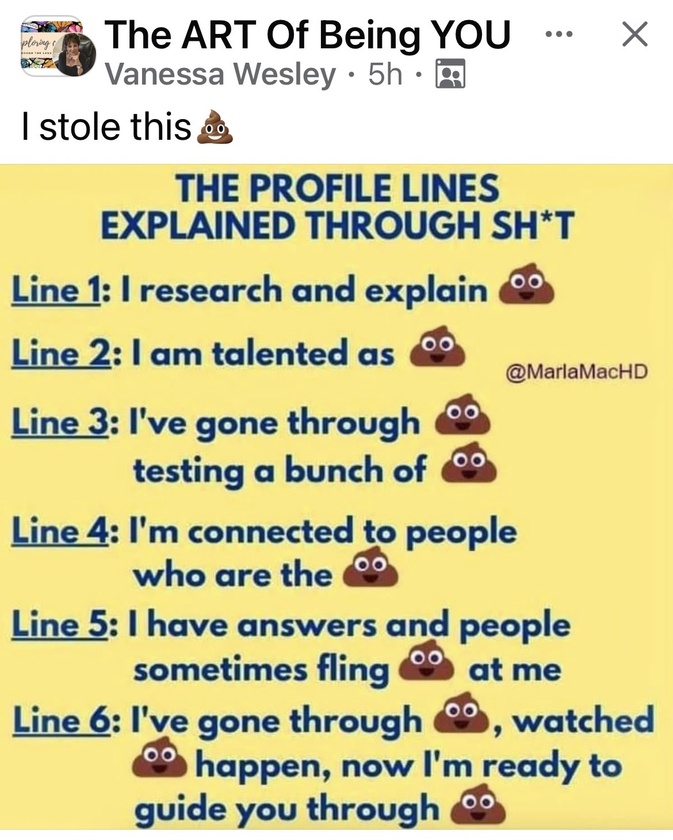“And then you get to the 4th line unconscious (1/4) and it says, ‘Leave me alone.’ This is creative aloneness. And it’s one of those things that are very healing for the 1/4, to have its opportunity to live out its creativity alone. In other words, these are people that cannot be creative communally. Doesn’t work for them! They don’t belong in communal arts, as an example. This is a distinct theme of being deeply creative in your own aloneness.
And, of course, that creativity can add so much depth, it can bring so much richness into the 1/4 life. Because after all, they are really here to know something, they are here to grasp something at a deep level, and to be able to put that out into the world. Yet a lot of that means that because they are 1st line personality, because they have this chameleon need to be introspective and to get into things, they need time alone!
Children in the same room – it’s one of those horrors. There are certain profiles that should never be forced to grow up sleeping in a room with a sibling. A 1/4 has to be left alone! They need to
have their own space, they need to have their own space from an early point in their life, in order to have that time to be alone, to learn to see that in being alone they get important work done.
There are some profiles, e.g. 6th line profiles, in which the major part of the work is done much later in life. And there are many profiles where the real work is done early. For the 1/4 – and this is very important – it is early work. These are children that need to be focused at an early age. And focused according to their nature, obviously. But focused in the things that they are encouraged, so that they can really get into them, get really deep in them and be creative in that. So that they can go out there and externalise and feel healthy.
The other thing is, if you have a 4th line unconscious, one of the things to keep in mind, like here in the 1/4 and the 2/4, is that there are all kinds of people that want to befriend you, and you don’t know why they are there. The 1st line after all doesn’t know that there is anybody out there – it’s personality. But that 4th line unconscious is going, “Hey, I’m available – come over here. I’ll be your friend!” And that 1st line personality is saying, “What are they doing here? Why are they here?”
I’ve so many 4th line unconscious people. I say to them, “You know, you’ve got this social blah blah...,” and they say to me, “Yes, but why are they here? What do they want? What do I have to do?” When you are dealing with that 4th line theme unconscious and you’ve got a 1st line personality that says, “Is there anybody out there, really? I was looking at this book – I didn’t know there was anybody out there!” All of a sudden they have to deal with all of that. So in the early part of their life, where they are more sheltered, if they are properly nourished, if they can get into their creativity, they can get the main part of their work done. And then they are going to be a lot healthier when they go out there into the world with that kind of opportunity that people are coming at them, they can find the right kind of people for them.
Sexual strategies are really funny. Here with the 1/3 and the 1/4, they are both Pursuer/Pursued, so they’ve both got caveman personalities – they both really want to be able to go out there and just get them. And then you have this 4th line unconscious. The 1/3 says, “I’m going to go out there and get them, and then I’m going to divorce them.” That’s basically its movement in life. And the 1/4 is different; it says, “I want to go out there and get them,” but what you are looking at is that the sexuality is the Confidante or Not. In other words, you have to go out and get them as a friend first. Now this is the whole thing about 4th line themes, the nature of the 4th line is about friendship, it is about brotherhood/sisterhood. That is a sexual strategy that says, “I have to become friends first.” And when I become friends first, if we get to know each other, then, at some magical moment – usually a very boring moment for the two of you – you cross the line from friendship (“Well, after all, we need the stimulation!”) and you end up in sexual intimacy. Now that is a 4th line theme. That’s what the 4th line has to do.
One of the things to understand about friendship is that friendship at the emotional level, the 4th line at the emotional level – in other words, all the 4th lines of all the gates in the emotional system – that all those 4th lines operate out of a wave, and that wave is Kindness/Meanness. That’s very important to understand in terms of 4th line sexual strategy. You become friends – everything is kind. You become friends and they tell you all about their lovers or their past lovers or their problems, and you tell them all about yours, and you are real buddy, buddy... And then that boring moment comes, and the two of you cross that line into intimacy. And then you wake up the next morning and the kindness has turned to meanness, because the moment one of you does exactly what you’ve described in your relationship to the others, you point it out: “You are not going to treat me the way you’ve treated her!” You know, blah blah blah. So kindness can easily become meanness. And one of the things to be clear about, if you’ve got a 4th line strategy sexually in your life, recognise that you have to hold your tongue. Anybody that you become friends with, that you are really interested in – don’t tell them all that stuff! Talk about the weather. Because it will come back to haunt you. So be careful with that 4th line!
So what you have in that 4th line being, the 1/4, this is a different person. They have a lot of social interaction in their life, there is a disappointment in their life. Their disappointment is if they can’t find somebody who will accept their 1/4 externalisation. However, their whole capacity here is to be able to be a real authority (that’s one of their things) and to be able to be the source of other people’s need for strength. 1/4s seem to be like oak trees. They seem like very, very solid beings. You can put your arms around a 1/4 and you are sure that you are not going to fall over. That’s why they make great friends. And, of course, you have to remember that because they make great friends they end up fatigued by having all kinds of people tell them all kinds of stuff. The thing with the 1/4 is this: the 1/4 is desperate to externalise their truth, and what they get is everybody else telling them their stuff, and they get exhausted. They are always waiting for their moment to get their 1/4 business out, and everybody is telling them everything else...
When you are dealing with the unconscious of the 1/4, you are dealing with the Benefactor/Dependant. Remember, that 1st line never wants to be dependent – it wants to be a self-provider. But the 1/4 changes the game. And the moment you have the 4 unconscious, what you have is somebody who is ready to be, and willing to accept being, a dependant in order to get its opportunity to be the benefactor. It is ready to accept that as part of friendship in its process. It often is looking for support, after all. The 4th line carries a strong missionary theme. Because it’s able to externalise, it can go out there into the world – it can really get things out there. And so it can really end up being a deep benefactor for others, but it may have to go through periods of dependency. This is not a quitter – it’s not a 1/3! It’s not going to break the bond. It’s even willing to be dependent until it can get to that point that it’s recognised. So it will put up with the friends that are telling them all of their stuff as long as they can finally have its opportunity to externalise its thing.”
~Ra Uru Hu



















